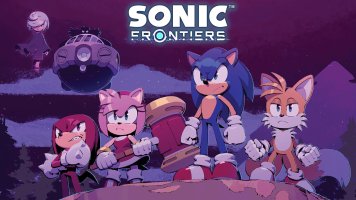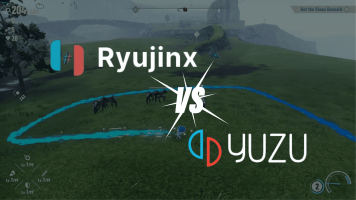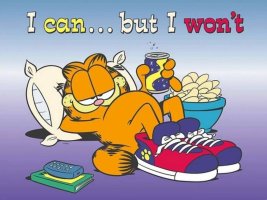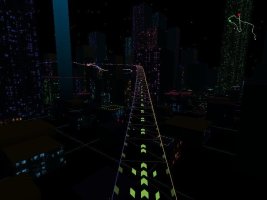Of course, avid game players have been listening to her musical scores for over a decade now, which includes music for Minecraft, as well as the soundtracks for Chicory: A Colorful Tale and the BAFTA-nominated Celeste score. She's currently scoring the respective follow-ups to those games: Wishes Unlimited's Beastieball and Extremely OK Games' Earthblade.
But did you know that Raine has also written a book, released her own album, and is also a programmer in her own right? She's just announced her very first solo video game project titled ANOTHEREAL, which is a genre mashup of the shoot 'em up genre combined with the storytelling and role-playing mechanics of RPGs, all of which feels right for a creator that can't stop playing outside the lines.
Not to stress you out, but I'm going to list some famous video game composers, and then tell you one thing they all have in common: Russell Brower, Nobuo Uematsu, Koji Kondo, Yoko Shimomura, David Wise, Austin Wintory…between all of them, they have zero games that they've made on their own. So let's start there. What made you want to make your own video game?
Lena Raine: I mean, I honestly got my start in the games industry kind of by accidentally landing into game design.
I graduated from college in 2006 with a music degree, and I really wanted to get into games as a composer. But at the time, there were just no jobs for the kind of music that I was writing. I was not [making] the big epic Hollywood sound, I wasn't what AAA developers were going for, and so I was like, 'Well, I need to find a job so I can move out of my parents' place.' And so I got into game testing. I worked at Nintendo for two-and-a-half years doing certification testing. Then I worked at Warner Brothers Games and I eventually landed at a company called ArenaNet who was developing Guild Wars 2. I was a tester there first for about six months before a design position opened and I was like, 'Well, I've worked with these tools to test the game, it would be kind of fun to see if I can make it as a game designer.'
And so I started doing that after hours. I was playing around in the engine and designing my own events and quests and stuff to feel out the design tools. And I took a really large liking to it. I actually got that job as a game designer. I worked on a prototype project for a while, developing systems basically from scratch in the scripting tools. And then once that prototype sort of folded, I got brought on to Guild Wars 2 and became a full-time designer there.
And so I spent maybe six years as a game designer before I ever got a big profile composition job. I was still writing music in my free time to keep that passion alive, but at the same time, I started developing this huge affinity for game design because all of a sudden I had spent just as much time doing that as I had writing music.
Now, after working as a composer for a while, I started revisiting that passion for game design - '[Now] I have enough resources, I know enough people that I can probably figure it out!' And I can develop another skill, I can learn programming, I can do all these other things to try and make a game project, because that's what I've wanted to do for a long time.
So you've always wanted to do this.
Yeah!
No, I've always been a composer from a very early age, writing music, all of that, but I never had the opportunity. And then once I did become a full-time composer, which was, you know, the goal, then I started feeling like there was something else missing. 'I really want to do game design again.' And making my own game was kind of a way to do both.
I want to get deeper into your upcoming first game, ANOTHEREAL. All we know about it is from the short trailer. I am deeply interested in why you chose the shoot-'em-up genre to marry with RPG mechanics.
When I'm looking at game design, I am pulling from a lot of my favorite experiences in games. I love RPGs, but one thing that's dulled my interest over the years are the types of combat systems that are currently prominent in them. I mean, turn-based is great. I love a good turn-based system. But everyone's doing them. It's kind of like everyone is trying to recapture the mystique of the 16-bit era [with] Mario RPG mechanics and timed-button presses and all this stuff, and there's just a huge resurgence of classic RPG style games... and that's really cool, [but] I still want to try and do something different, because I love weird RPGs.
One of my favorite RPGs is this game called Resonance of Fate, which is this Playstation 3 RPG that is just absolutely bonkers. It was made by tri-Ace. Have you played it?
No, I've not played it. I'm curious to know why it's bonkers.
I'll try to sum it up. It's very bizarre. You have three characters in your party, it's always the same three characters. But the combat system involves two types of guns: pistols and submachine guns. Pistols do "direct damage," [but] enemies generally have a high resistance to pistol shots, for some reason. Then submachine guns do "scratch damage," which enemies have a lesser resistance to [and] they do more damage faster, but scratch damage can't kill them.
So you have to convert the scratch damage into real damage, which as soon as [enemies] get shot with a pistol, it converts into real damage, and only then can you actually finish them off. They are also surrounded by shields, so there's all these things to consider like positioning, and it's just bizarre. It's all these kinds of mechanics you never see in many other types of games, I love that kind of stuff.
And while games like Undertale and Deltarune kind of have these hybrid systems of shmup-like bullet dodging, it's still command-driven battles. That's really cool, why not do a full-on shmup-style combat system? Shmups are very usually long stages and have these very scripted progressions...it's kind of like the primary game mode. But I could make this bite-sized, I could make this into one dual basically, you versus an enemy.
And that's what got the ball rolling - 'What if I made combat into a little shmup battle?' You win it, you move on, you do more RPG stuff like exploration, talk to people, and stuff like that.
So is the shmup genre distinct in some key way from 'bullet hell,' or is it synonymous?
I mean, there's a whole bunch of nuance in the shmup genre. There's Touhou-style bullet hell, which is about the fireworks and the spectacle of it, it's about the beauty of the bullets as you're trying to not die [laughter]. Then you've got CAVE-style shmup, where it's all like fast-action bullets coming at you extremely fast, and you're teasing out the directions because they're honing in on you and [you're] dodging out of the way. You've got all these different styles. And mine's trying to fit in closer to Touhou style, without going as insane as Touhou does. Because I still want it to be playable by an RPG gamer.
Sure. But I mean, your trailer looked… intense? [laughter]
[laughter] Intentionally, to show the variety of different types of encounters. I definitely put in a couple of shots where it was like, 'This is the highest difficulty, good luck!' And even since [the trailer's release], I've been tweaking a lot and changing the speed at which bullets are going or how the bullets are formed. There's a lot that you can tweak in a real-time system like that. It's a constant playtesting, doing some tweaks, seeing how it plays with my friends that are of different skill levels
Before I move into the narrative aspect of your game, I just wanted to say that I'm a little bit ignorant of the genre because growing up, when I was a kid, something about these specific kinds of games almost felt like contraband. I don't know why, but they were always published in the most bootlegged ways.
Oh yeah, especially Japanese shmups. It's been really difficult to find English-localized versions of them. They've become more prevalent in recent years, because there's a lot of fan translations and official translations of these games, and now Steam [gives] access to their Japanese store, [so] you can still get untranslated shmups off Steam, even if you can't understand them. But yeah, having that language barrier puts a buffer between you and the genre.
Plus also, the nature of a lot of Japanese shmups is they are distributed on CDs at physical conventions more often than not. It's like that doujin-style game distribution [model]. And it's only recently been kind of more accepted to put things online so people can download them.
When I was a kid, it kind of felt like a guy being like, "Here kid, take this floppy." [laughter]
Exactly, and load [it] into your Commodore 64 and run a program and eventually you'll be able to play it. Maybe.
But ANOTHEREAL is also a narrative game that seems to have a lot of emotional beats. Maybe, maybe not. Can you just speak a little bit about what you want people to feel when they play it?
I'm a huge fan of doing metaphor with my gameplay design that ties into how the game feels, as well as the emotional response of the characters.
That's something where, for example, I definitely didn't have any input in the design of Celeste, but it was something I learned from Celeste while working on it. Game design can function on multiple levels, and it can really be a vector for the emotional resonance of the story. And you don't have to have a lot of dialogue. But my game does have a lot of dialogue. [laughter] It's a matter of making sure that all of the emotional beats are matched up to what the gameplay is doing.
ANOTHEREAL is definitely an emotional story, one that is intentionally mysterious from the outset. A lot of games do your very typical amnesia, I'm-discovering-the-world thing for the protagonist because it's a very easy jumping-off point for a new player coming into the world. My approach is kind of similar, but kind of different, where the main character, named Astra, has an understanding of the world that is not correct, which she comes to discover as she re-emerges into the world. She's been a bit of a recluse, holed herself up in her room for an undefined number of years, then she's invited out by her sister, who is one of the only people that has been close to her in her life, and she decides, 'Okay, maybe now is the time to actually reemerge.' From there you discover things aren't quite as normal as you might assume them to be.
You touched on how sound design informs the game. I don't have any special insight on how Celeste, Chicory, Harmony: The Fall of Reverie, or any of the games that you've worked on were designed in this regard. But you, more so than many, it seems like your scores somewhat inform the game design, or maybe vice versa… but now you don't have a client. How is that feeling?
It's very much like just taking off and putting on various hats. I am basically my own client in a lot of ways where I have to dig deep into one aspect of the game, and then I go into a different role and interrogate myself as I finish something and [then] I'm doing sound design or whatever, and figuring out what is actually best to do in this situation. How dynamic do I need to make music? What additional cues do I need to make? And so there's a lot of putting on that producer hat of, 'Okay, what is the bare minimum that I need to have for this scene to work?'
Relating it back to the top of the interview, I feel like if Koji Kondo came out and said, "I'm going to make my own game," there'd be so much pressure for it to sound amazing. Do you feel any pressure on your soundtrack?
I mean, always. No matter what I'm doing, I always feel this kind of pressure to one-up myself in some way. Every game is different. Every game has its own needs. Something like Beastieball, which is what I'm currently working on, has a very different aesthetic from the previous game that I did with Wishes, Chicory, which had live instruments and [was] polished and all of that. Whereas Beastieball is super kind of 'rough', you know, it has Super Nintendo samples and stuff.
But there's always the pressure to at least sound different, especially doing my own game. Obviously people are going to be coming to it because they know my music more so than [because] they read my writing or [saw] my game design or whatever.
You've written a book. You've made an album, and now a game. In your creative process, are you attracted to other mediums such that you simply say, "I want to go play in this medium and play with its form and see what comes out," or do you just make stuff and then… wherever it goes is where it goes?
I like to play within various medium [constraints] to start. What I've always said about myself is [that] I'm a storyteller at heart, so everything I do is telling a story in some way, whether it is writing music, or writing actual words, or doing game design, or whatever it is. As long as someone can take something out of that and go on a journey, that's what matters to me.
Since you just mentioned it, I want to briefly touch on Beastieball and give you my own experience with your work. I listened to whatever is already available from that soundtrack online, and I was a little bit surprised! The song "ROWDY!!!" was the first thing I listened to.
Yeah! Yeah! [laughter]
And it was retro-styled, just the way someone might imagine, but with… piano? And because of that it came across to me like '90s chamber techno or something. I don't know, maybe Moby or something? It was really interesting to me in a way I wasn't expecting.
I mean, Beastieball is a fun experiment where we're coming to it from an approach of essentially designing this weird, long-lost Super Nintendo score, essentially. But it's taking Super Nintendo sounds and infusing them with some more modern sensibilities. A lot of the town themes and exploration themes start with the Super Nintendo samples as kind of the base, and then I start putting more stuff in there and getting some hip-hop beat or some other sound design in there to put it in a different space, so it's not just a Super Nintendo track - this couldn't be playing on a Super Nintendo, but it still has all of those elements that get you nostalgic for that stuff.
But, you know, [it's] nostalgic for me, in that these are the sounds that I grew up with. So that could be recording something with an older microphone or using an instrument from an earlier period of music.
Combining volleyball with Pokémon-style battles, Beastieball looks like a great fit for Switch - although there's been no announcement as yet
Yeah, and that's kind of like what I was talking about before looking at RPG design. You can just emulate what's been done, but I think what's more interesting is to bring it into a conversation with the present day so that you're still taking in inspiration, but you're bringing it forward into modern times, because we don't need to just keep on repeating the past.
I agree. By the way, Greg [Lobanov of Wishes Unlimited, developer of Chicory and Beastieball] let it slip to me earlier — and I don't know if this is privileged information — but he told me that you two were on a volleyball team.
We are, yeah. We have an amateur volleyball team that we're on.
I have to ask, does actually playing volleyball inform how you would score a volleyball game?
I mean, learning more about volleyball definitely has helped me score Beastieball, in terms of the culture around volleyball players and games and professional matches and stuff. There's so many weird quirks that I find fascinating.
Like, one of the things that has accidentally played into the score a bit, which a lot of people discovered through the Olympics, are some of the traditional volleyball hype songs that happen. The way that a volleyball match happens in a big arena is that everyone's quiet for the plays and stuff, and then they do volleys and they bat it around and then a point's scored. A music cue happens every time a point is scored, and sometimes it's a very specific music cue that's exclusive to volleyball.
For example, there's the concept of a 'monster block,' right? So someone is just like, "Boom!" Just dominating the net. They get a monster block, and then the arena plays 'The monster block song.' And it's like, this f***ing really cheesy song. It might go: [in a deep voice] "Monster block, monster block, monster, monster!" And it's like, what is this? Who wrote this? And I've been doing this investigation: what are [these] volleyball songs that play during professional matches? There was one that was just, [in a deep voice] "Here comes the boom, here comes the boom!" And it's just a sample or recording or something. I was like, 'This is so silly. I love this!'
And so we started incorporating samples of things into the Beastieball songs. There's one character called the Sports King, and he's sort of like a bit of an antagonist in the game. But the Sports King Theme has a little sample of Here Comes the Boom! in there, but it's, 'Here Comes the Sports King!'
It's like Jock Jams.
Yeah, exactly. And it's just like that weird audio-s**t post-style of sampling [...] if you're familiar with SilvaGunner, it's a YouTube channel that does high-quality rips of game music. The guys are uploading songs legally onto YouTube, [and] it's actually a bunch of really clever remixes. But they have a lot of memes and stuff that they bring into their songs and they'll put samples from things in there, and just to goof on whatever.
I was introduced to them, not knowing who they were. This is a collective of remixers. They did a rip of Celeste when that came out. And I was getting kind of aggro about people uploading my music onto YouTube, because I uploaded it myself, you don't need to do that! I came across one that I thought was just a normal upload of my music, and then everyone was [in] my mentions on Twitter, being like, "You don't know? You don't know?" And so then I listened to it, and, 'Oh, they're doing something here.' [laughter]
Since then I've become a big fan of just listening to their silly riffs off of various video game songs. And so I've come to embrace that into my own style for Beastieball, to not take things too seriously and just be really silly with it. Especially for some of the more villainous characters, they're kind of part of this absurd commercialism of sport that is happening with Beastieball.
I know ANOTHEREAL is not yet technically announced for console…
Yeah, I mean, I'm one girl, I can only do so much, so my approach right now is I want to finish the game for PC and make sure it's a good game, which will take a while. And in that time, who knows what'll happen with the console landscape. So I'm observing what's going on and I've got connections. Maybe I'll be able to get funding to do more with the game. I'm really hoping to.
I am also self-publishing right now, so if there eventually is, down the line, a publishing partner, they might be able to help me get going with stuff. Things like you expect from console releases, like localization, all that stuff, that all takes money, that all takes publishing support. I'll keep working on the game and putting stuff out there about it, and then maybe I'll have opportunities come up from getting the game out there.
So this has all been quite a journey for you. Let's finish with this thought. 10 years from now, Lena is known as a world-famous game maker - are you still going to be taking on clients [as a musician], or maybe by that point you'll be… a poet laureate?
[laughter] Oh goodness. I'm always, you know, I love working with my friends and that's where I'm at right now with game composition. I'm working with Greg, I'm working with the folks at EXOK on their next game, Earthblade. I love working with them, they're my friends and as long as they keep making games and I have the time for it, I'd love to keep working with them. And then there's opportunities that come up. I did a little bit of help on the game Deltarune. [Ultimately,] I'd love to keep working with friends on additional things, even if I'm not the main composer on it. That's kind of where I see myself.
But still, I do really want to put a concentrated effort on doing more game design and really having my stories out there, as well as the ones that I'm helping to make.
So let's speak it into existence! Who's your dream client?
My dream client? Oh, I mean...I don't know.
I mean, you did Minecraft, right? Does it get any bigger?
As far as the number of people playing the game, probably not. Minecraft is pretty huge. That's almost beyond the limits of what I consider for myself. But you know, it's one of those things where if I was asked to score a new Zelda game, would I say no? Absolutely not. You know, the sky's the limit for those sorts of things. I'm a huge fan of Nintendo franchises. I'm a huge fan of Square Enix and the Final Fantasy and Xeno games of the world.
If there's any opportunity to work with other composers and collaborate on things or emerge into a different franchise that I'm a big fan of, yeah, that sounds amazing. But it's kind of like, do they need that help? Is there the capacity for it?
I don't know, the sky's the limit, honestly.






